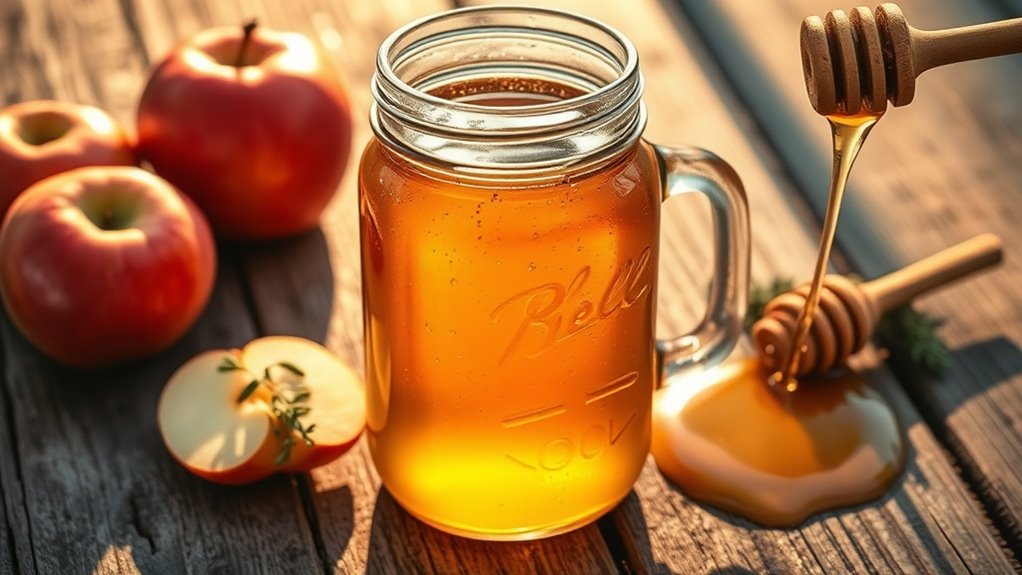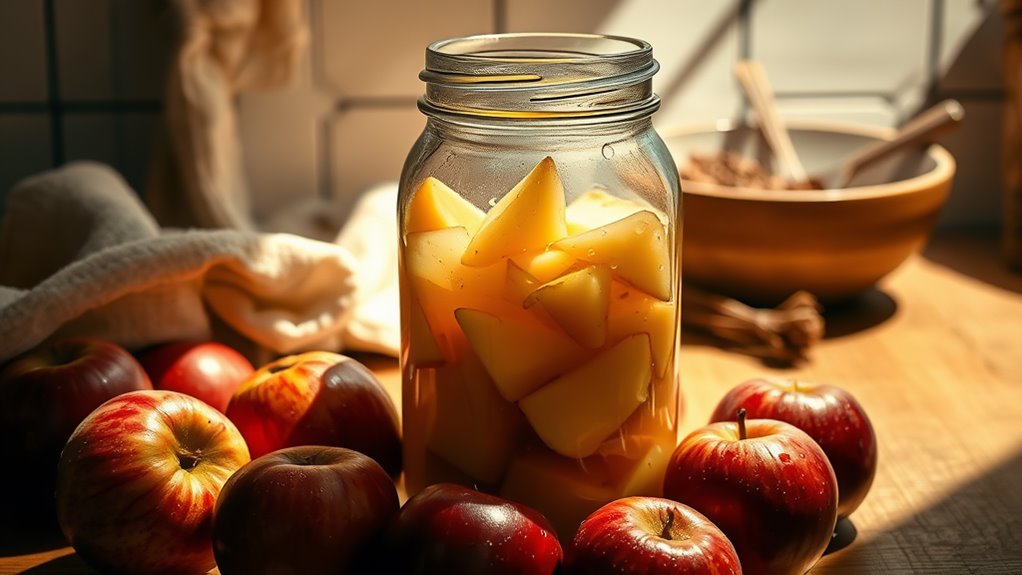The DIY Apple Cider Vinegar Recipe Everyone’s Using Right Now
You’ll discover how simple it is to make potent apple cider vinegar at home using organic apples, filtered water, and sugar. Cut your apples into 1-inch chunks, place them in a sterilized glass jar, cover with water, and stir in sugar until dissolved. Cover with cheesecloth and let ferment in a dark spot for 2-3 weeks, stirring daily. This traditional method yields raw, unfiltered vinegar packed with probiotics and enzymes – let’s explore the powerful benefits and uses.
Why Make Your Own Apple Cider Vinegar
Why spend money on store-bought apple cider vinegar when you can make your own at home? Homemade apple cider vinegar gives you complete control over the fermentation process, ensuring you’ll get a raw, unfiltered product free from artificial additives and preservatives.
You’ll save substantially on grocery costs while creating a sustainable practice that transforms kitchen scraps into a versatile ingredient.
Your homemade apple cider vinegar will contain beneficial probiotics, enzymes, and the “mother” culture that many commercial versions lack. Additionally, it offers antimicrobial properties that can help combat harmful bacteria.
Plus, you’ll experience the satisfaction of crafting this ancient health tonic using traditional fermentation methods passed down through generations.
Required Ingredients and Equipment
The basic ingredients and equipment needed for homemade apple cider vinegar are remarkably simple.
You’ll only need organic apples, filtered water, sugar, and a few common kitchen items to get started.
The process requires minimal investment but delivers maximum results.
- A large glass jar (1-gallon capacity) with a wide mouth for fermentation
- Cheesecloth or coffee filter to cover the jar and keep out debris
- A sharp knife and cutting board for preparing the apples
- Kitchen scale to measure ingredients accurately
In addition, using raw, unfiltered apple cider vinegar can enhance the fermentation process and improve the flavor of your homemade vinegar.
Store these supplies in a clean, dry area until you’re ready to begin the fermentation process.
Step-by-Step Brewing Process
Now that you’ve gathered your ingredients and equipment, making apple cider vinegar starts with proper preparation of your apples.
Wash and cut your apples into 1-inch chunks, keeping the peels, cores, and seeds intact.
Fill your sterilized jar two-thirds full with apple pieces, then add filtered water until the apples are completely submerged.
Stir in raw honey or sugar until dissolved.
Cover the jar with a breathable cloth and secure with a rubber band.
Place in a dark, room-temperature spot for 2-3 weeks, stirring daily to prevent mold growth. This process allows the natural fermentation to occur, which is essential for creating raw, unfiltered apple cider vinegar that offers maximum benefits.
Storage and Shelf Life Tips
Proper storage of your homemade apple cider vinegar will greatly extend its shelf life and maintain its beneficial properties.
When you’ve finished the fermentation process, strain your vinegar through a fine-mesh cloth and transfer it to airtight glass containers.
- Store your vinegar in a cool, dark place away from direct sunlight – ideally between 60-80°F.
- Use dark-colored glass bottles to protect against UV damage and preserve nutritional content.
- Don’t store in metal containers, as the acid can cause corrosion and affect the taste.
- Properly stored homemade apple cider vinegar will keep for up to 2 years if sealed, 6 months once opened. Additionally, freshness indicators like minimal oil separation and original aroma can help you determine its quality.
Health Benefits and Uses
Homemade apple cider vinegar offers numerous health benefits and practical uses that make it a valuable addition to your daily routine.
You’ll find it can help regulate blood sugar levels, support digestive health, and boost your immune system.
It’s also rich in beneficial compounds like acetic acid and natural probiotics.
You can use your homemade apple cider vinegar to create invigorating hair rinses, soothe sunburns, or clean household surfaces naturally.
Add it to salad dressings, marinades, and beverages for a tangy kick.
When diluted, it makes an effective natural toner for your skin and can help maintain your scalp’s pH balance. Additionally, regular consumption may lead to a reduction in fasting blood glucose levels, supporting overall metabolic health.







